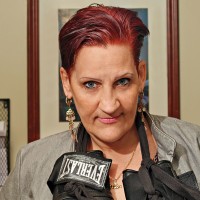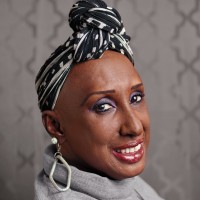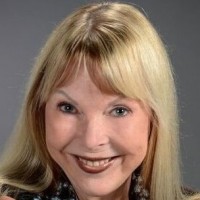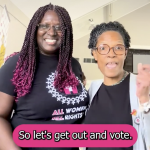Click here to read a digital edition of this article.
Introduction | A-C | D-G | H-K | L-O | P-S | T-Z
Arianna Lint
HIV Positive
Fort Lauderdale, Florida

Arianna LintJonathan Timmes
A trained lawyer, Arianna came to the United States as a refugee from Peru after her activism and policy work there led to threats against her life. She tested positive in 2006, and though initially, she kept her status a secret, she has since become a fierce advocate for trans people living with HIV. She has worked with the Florida Health Department, Broward County HIV Health Services Planning Council, SunServe, Prevention Access Campaign and Positively Trans (T+), a project of the Transgender Law Center. She’s a blogger and a board member for The Well Project and serves as the East Coast chairperson for the TransLatin@ Coalition and the CEO of Arianna’s Center, which serves to empower and educate HIV-positive trans people and takes into account their immigration status as well as previous sex work experience and incarceration history.
Nichole Little
HIV Negative
Oakland, California

NIchole Little
Nichole is the founder and executive director of Sexual Health Education Research & Outreach (SHERO), a community and personal development network in Oakland she started 15 years ago in response to the dearth of health information reaching the Black community. As the organization’s acronym makes clear, much of its work focuses on women, specifically women and HIV. Nichole is the chairperson of the board of directors of AIDS Project East Bay and is also a member of HIV advocacy group AVAC’s PxRoar program, through which she facilitates a focus group on women’s sexual health. In addition to addressing women, Nichole makes it her mission to include members of faith and LGBT communities in her HIV outreach as well as Black fraternities and sororities.
Barbara J. Lock
HIV Positive
Tucson, Arizona

Barbara Lock
When Barbara tested HIV positive in 2006 at age 58, she was struck by the lack of services for women living with HIV in Pima County, Arizona. So she decided to establish the nonprofit organization PowerSource Tucson (PST) to aid this underserved group. Through her leadership, PST offers a variety of services and programs, including support groups, emergency assistance and scholarships to a yearly HIV retreat, for which Barbara serves as a planning committee member. In 2016, PST was awarded a grant for Bridging the Gap, a program that connects newly diagnosed women to medical care. Additionally, she serves as a member of the Arizona Statewide Advisory Group for Ryan White–funded agencies. Thanks to Barbara, these once-overlooked women are now receiving the help they need.
Sylvia Lopez
HIV Negative
Austin, Texas

Sylvia Lopez
Sylvia started volunteering for her local HIV counseling and testing program when the epidemic was just beginning, in 1986. She then worked at the Austin Health Department, before joining the staff of AIDS Services of Austin in 1989. Nine years into her tenure at the organization, she launched the Women Rising Project in order to provide education, support, advocacy and peer leadership opportunities for HIV-positive women in central Texas, who had long been ignored in the state’s response to the crisis. Sylvia is also one of the founding members of the National Women and AIDS Collective and sits on the group’s board. She was recently cited by the U.S. Office of Women’s Health for more than 20 years of leadership in advocacy around women and HIV.
Theresa Mack
HIV Negative
New York, New York

Theresa Mack
For 26 years, Theresa, a licensed physician, has provided access to quality care for clients with HIV in Harlem. Many of her patients know her as “Dr. Angel.” She was once the associate medical director of the St. Luke’s Roosevelt Hospital Center for Comprehensive Care. Nowadays, she is a medical editor for The Well Project and the medical director at Mount Sinai’s Doctor Faculty Practice in the heart of her beloved community. Theresa is also a member of the Healing Hope AIDS Ministry at a local church and serves on the board of directors of Iris House, an organization that provides HIV services to women. She’s also on the boards of St. Mary’s Center and COPE (Coalition on Positive Health Empowerment) and on the steering committees for the American Academy of HIV Medicine and the Ryan White Medical Providers Coalition. Her HIV work has tremendously benefited those in her neighborhood.
Julie Marston
HIV Negative
Medford, Massachusetts

Julie Marston
Julie helps put HIV meds in the hands of more than 10,000 Massachusetts residents. That’s because she’s the cofounder and executive director of Community Research Initiative (CRI), a New England nonprofit dedicated to HIV and hepatitis C clinical research, treatment education and financial assistance for accessing approved meds. In addition to helping with the Food and Drug Administration approval of meds, CRI also administers the state’s HIV Drug Assistance Program and the PrEP Drug Assistance Program. Julie got her start in AIDS-related health care at the Boston Department of Health and Hospitals and cofounded the Children’s AIDS Program. She’s active in the Women Entrepreneurs in Science and Technology and numerous other groups.
Nina Martinez
HIV Positive
Atlanta, Georgia

Nina Martinez
Nina has been living with HIV since shortly after her birth in 1983 and has been an advocate for most of her adult life. After pursuing graduate studies in epidemiology at Emory University, Nina became a public health analyst at the CDC. She currently sits on the board of The Grassroot Project in Washington, DC, which trains NCAA Division I athletes in the DC area to deliver a sports-based curriculum that promotes positive sexual health and healthy lifestyles for at-risk students in middle and high schools.. She used her skills to help adapt the global People Living with HIV Stigma Index for use in the United States and is involved in several long-term National Institutes of Health studies on people living with HIV to improve our understanding of the virus. But Nina doesn’t limit her advocacy to academia—she was arrested three times this year while defending the Affordable Care Act.
Carolyn Massey
HIV Positive
Laurel, Maryland

Carolyn Massey
Carolyn is a champion for HIV-positive women over age 50 and currently serves as the executive director of the DC- and Baltimore-based advocacy group OWEL (Older Women Embracing Life). The 24-year survivor of the virus helps to prepare women living with HIV, hepatitis C and other chronic illnesses to thrive despite their health challenges by providing them with strength through networking, advocacy training and social support services. Carolyn is the director of Positive Impact Ministry of the New Samaritan Baptist Church and has worked with the office of AIDS research to educate members of Congress about the needs of HIV-positive people. She has also collaborated with the DC Places of Worship Advisory Board, the Greater Baltimore Health Services Planning Council and many other local, regional and national boards and councils.
Glenna McCarthy
HIV Positive
New York, New York

Glenna McCarthy
Glenna’s journey is hinted at in the title of her memoir, Damaged Goods: A Woman Who Became Her Own Hero. Glenna has faced some big obstacles in her life (sex work, drug use, prison, hepatitis C coinfection), but through self-care and hard work, she has overcome them (she is cured of hep C, her HIV is undetectable, she’s been sober for eight years). While incarcerated, she became a speaker and facilitator for various HIV programs and is now working toward a master’s degree in social work. (She’s also a POZ blogger with a penchant for poetry.) At the Acacia Network in New York, she helps people with hepatitis C navigate their way to health, teaching others how to become their own heroes.
Rita McDaniel
HIV Positive
Durham, North Carolina

Rita McDaniel
One of Rita’s main focuses is raising awareness about HIV and its impact on women. She is the women’s facilitator at Triangle Empowerment Center in Durham, North Carolina. As founder of the “It’s All About Me” support group, she works closely with HIV-positive minority women of all ages to address short- and long-term goals, promote self-empowerment and encourage healthy living. Rita also organizes prevention programs around safer-sex practices and PrEP for women, including a pajama party event called “Pillow Talk.” She’s a true leader who reaches those most impacted by HIV through advocacy, peer education and community outreach.
Patricia “Pat” McNeill Shelton
HIV Positive
New York, New York

Patricia SheltonBill Wadman
Pat has taken on many roles: educator, speaker, advocate, activist, consultant and outreach worker. From her time at Harlem Dowling Westside Center to her 10 years helping patients at Settlement Health, peer education has been a major part of her work. Pat’s HIV community work spans two decades and includes stints at GMHC, TAG, Body Positive, Iris House, Harlem United and the HIV Planning Council of New York. In 2014, she was awarded SisterLove’s 2020 Leading Women’s Society Award, an honor bestowed upon women who have lived more than 20 years with the virus and who are active community members. She is currently the vice chairperson for Conscious Contact of New York, an organization working to end HIV/AIDS. She is also a member of the New York chapter of PWN-USA and serves on the consumer advisory committee for the New York State Department of Health’s AIDS Institute and other advisory boards.
Joyce Mitchell
HIV Negative
Sacramento, California

Joyce Mitchell
Joyce found herself at the forefront of HIV activism when she began to produce weekly segments on AIDS for Sacramento’s KCRA-TV during the early days of the epidemic. In 1995, she cofounded Capital City AIDS Fund (CCAF), a nonprofit organization focused on HIV awareness, prevention and education, of which she is now the chairperson. CCAF has raised more than $3 million for local services and provides college scholarships to people living with the virus. A five-time Emmy Award winner, she has produced numerous documentaries and stories about HIV, including AIDS in the 21st Century. For Joyce, “There is no turning back with this cause.” She recently joined POZ as a blogger.
Candace Y.A. Montague
HIV Negative
Washington, DC

Candace Montague
Candace believes that one of the most compelling ways to make a difference is through writing. That’s why when she saw a documentary about African-American women and HIV, she was inspired to use her background in community health promotion and education to become a journalist and bring awareness to the chronic disease. For nine years, she has covered HIV-related news for publications such as TheBody.com, TheGrio.com and The Black AIDS Institute’s weekly newsletter. In 2014, she was awarded the ADAP Media Story of the Year from the ADAP Advocacy Association (aaa+) for her piece “Continuing HIV Care for Formerly Incarcerated U.S. Citizens.” Candace has served on several panels on HIV in the Black community.
Johanne Morne
HIV Negative
Albany, New York

Johanne Morne
Johanne is the director of the AIDS Institute at the New York State Department of Health, one of the largest HIV-specific public health programs in the country. Two years ago, she helped spearhead the state’s ambitious “Ending the Epidemic” initiative, which seeks to put a virtual stop to new infections and HIV-related deaths in New York by the end of 2020. Her leadership has led the state to streamline HIV testing, facilitate wider access to syringe exchanges and expand affordable housing for people with HIV. Her efforts have also helped expand access to PrEP, PEP and rapid access to treatment programs for newly diagnosed individuals across the state. Her leadership and collaboration with partners in government and research led the New York State Department to endorse PAC’s “U=U” consensus statement, making it the first state health department to do so.
Allison Nichol
HIV Negative
Washington, DC

Allison Nichol
Talk about social justice warriors. Allison worked in the Civil Rights Division of the U.S. Department of Justice for 20 years. This is the division that enforces the Americans with Disabilities Act—the law that includes a ban on discrimination against people with HIV. During her tenure, she was the department’s longtime expert on HIV law and policy. She participated in working groups on the National Strategy on HIV/AIDS and on the intersection of HIV and violence against women and girls. She also cofounded the division’s LGBTQI working group and has received several awards for her work related to HIV and equal employment opportunities. Currently, she’s putting her skills to work at the Sero Project, where, as the legal and policy counsel, she’s advising states on the best language to modernize HIV laws. Her knowledge and dedication have made it safer for us to go about our daily lives.
Ijeoma Opara
HIV Negative
Montclair, New Jersey

Ijeoma Opara
Originally from Nigeria, Ijeoma is now a doctoral research fellow for the Department of Family Science and Human Development at Montclair State University in New Jersey, where she’s focused on HIV prevention research that will help Black girls and women remain free of HIV and sexually transmitted infections. Her fellowship is funded by Project C.O.P.E. (Community Organizing Prevention Education), through which she also facilitates an HIV/AIDS, substance abuse and viral hepatitis prevention intervention geared to ethnic minority youth in an urban community in northeastern New Jersey. She’s passionate about prevention among girls of color and believes it is important to bring together community leaders, youth and experts to spark discussions in the Black community.
Teresia Njoki Otieno
HIV Positive
Federal Way, Washington

Teresia Njoki Otieno
Teresia has advocated for the sexual and reproductive rights of women living with HIV with groups such as the International Community of Women Living with HIV (ICW), the Technical Working Group and Kenya’s National Steering committee on the elimination of mother-to-child transmission. She is a 2014 AVAC fellow and has worked with serodiscordant couples and sex workers in Africa to increase access to PrEP. She has also worked to document the experiences of HIV-positive women who have endured coerced sterilization. She and other women fought back against the Kenyan government and an NGO that performed these procedures. She has engaged in international discussions around planned research to better understand the possible connection between hormonal contraception and HIV risk. Teresia is currently a project coordinator for ICW–North America.
Introduction | A-C | D-G | H-K | L-O | P-S | T-Z
To read the 2016 POZ 100, click here.
To read the 2015 POZ 100, click here.
To read the 2014 POZ 100, click here.
To read the 2013 POZ 100, click here.
To read the 2012 POZ 100, click here.
To read the 2011 POZ 100, click here.
To read the 2010 POZ 100, click here.







Comments
Comments